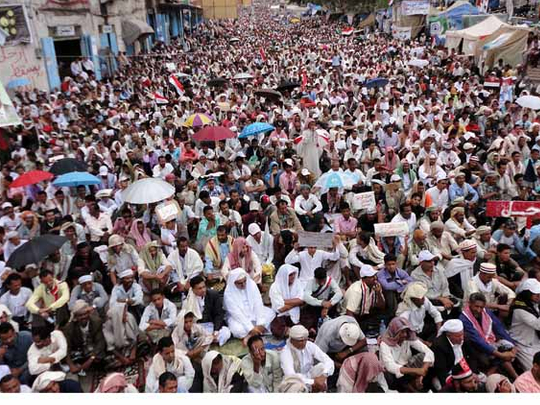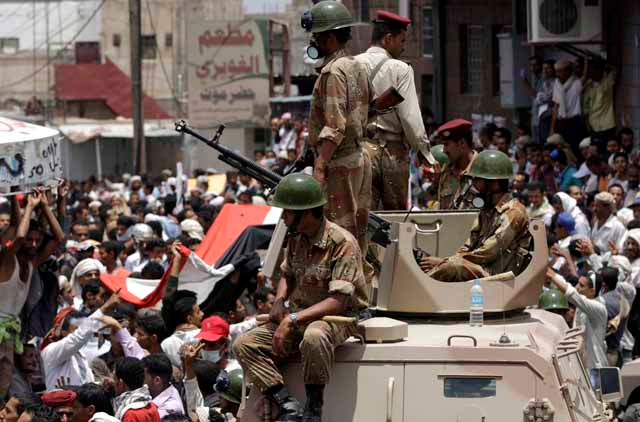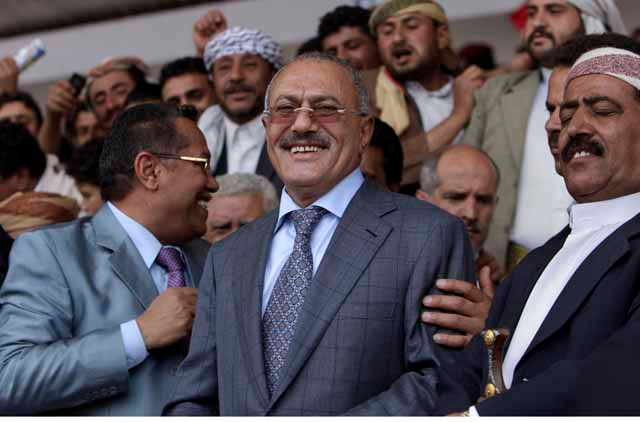
Sana'a: Two anti-government protesters in Yemen were killed and dozens were shot and wounded in fresh clashes with police on Friday as President Ali Abdullah Saleh rejected a new deal to secure an end to his 32 years in power.
Hospitals sources said 200 were hurt by tear gas in the city of Taiz.
There were rallies for and against President Saleh in Yemen on Friday.
Saleh, facing an unprecedented challenge from hundreds of thousands of protesters, initially accepted an offer by Saudi Arabia and other Gulf Arab states as part of the Gulf Cooperation Council (GCC) to hold talks with the opposition.
On Wednesday, Qatar's Prime Minister Shaikh Hamad Bin Jassim Al Thani said the GCC would strike a deal for Saleh to leave.
"We don't get our legitimacy from Qatar or from anyone else...we reject this belligerent intervention," Saleh told a crowd of tens of thousands of supporters in the capital Sanaa.
Frustration with the impasse may push the thousands of Yemenis who have taken to the streets closer to violence.
Some 21 people died in clashes this week in Taiz, south of the capital and the Red Sea port of Hudaida.
Fresh clashes broke out in Taiz on Friday when hundreds of protesters clashed with police, who fired gunshots and tear gas, wounding dozens, witnesses told Reuters.
The protesters had been carrying the bodies of five people killed earlier in the week to their gravesites when they ran into security forces.
Al Arabayia television said two protesters had been killed.
Doctors told Reuters five were wounded from live fire or beatings and another 50 were suffering from tear gas inhalation.
In the port city of Aden, once the capital of an independent south, thousands of anti-government protesters gathered peacefully and in Hudaida, some 15,000 gathered to mourn protester deaths and demand Saleh step down.
"We're tired of this poverty and oppression in Hudaida and all of Yemen," said protester Abdullah Fakira. "Enough already."
Some 40 per cent of Yemen's 23 million people live on less than $2 a day and a third face chronic hunger. Poverty and exasperation with rampant corruption, protesters say, drove the pro-democracy protests that began over two months ago.
Al Qaida fears
Even before the protests, inspired by regional uprisings, Saleh was struggling to quell a separatist rebellion in the south and a Shi'ite insurgency in the north. The potential for a violent power struggle with the opposition also could give Al Qaida's Yemen-based regional wing more room to operate.
These factors spark concern for stability in a country that sits on a shipping lane through which more than three million barrels of oil pass each day.
On Friday, local officials from Abyan, a hotbed for militant groups, told Reuters that military forces were trying to retake the city of Jaar, which state troops retreated from two weeks ago when they said they were overpowered by militants.
Security forces surrounded Jaar with tanks and artillery and clashed with what the official described as "jihadist militants", but they appeared to have fled. He said troops would soon enter the city.
The United States and Yemen's key financial backer, Saudi Arabia, both targets in attempted attacks by Al Qaida's Yemen-based branch, appear ready to push aside Saleh, their long-time ally against al Qaeda to avoid a chaotic collapse in one of the Arab world's poorest countries.
"Saleh's options are gone. The Gulf initiative must have come as a shock from Saudi Arabia, which was his last ally," Mohammad Sharqi, the leader of a youth protest movement in Sana'a, said, referring to the plan for Saleh to step down.
In an apparent effort to avoid a snub to Saleh's main backer, a presidential aide told Reuters the comments were not aimed at Saudi Arabia's offer to host GCC mediated talks.
"Saudi efforts are welcome, but we reject Qatari intervention," he said.
"The president welcomes the efforts of our brothers in the Gulf to solve the crisis but rejects the statements from the Qatari prime minister which he considers interference in Yemen's affairs," he added.
Washington froze its largest aid package for Yemen in February after protests began, the Wall Street Journal reported.
"The first instalment of the aid package, worth a potential $1 billion or more over several years, was set to be rolled out in February, marking the White House's largest bid at securing President Ali Abdullah Saleh's allegiance in its battle against al Qaeda in the Arabian Peninsula," it said.
Citing unnamed U.S. officials, the paper said the proposed package included up to $200 million in counter-terrorism support this fiscal year, up from $155 million in fiscal 2010, as well as a nearly equal amount for development aid.
The Washington Post said a Yemeni opposition party leader had told a U.S. embassy official in Sanaa about a secret plan to oust Saleh less than two years ago.
Competing Friday protests
Pro-democracy protesters held a "Friday of firmness" in Sana'a, shouting "You're next, you leader of the corrupt," as armoured vehicles and security forces deployed across the city.
Some 4km away, tens of thousands of Saleh loyalists were marching, waving pictures of the president and banners that read "No to terrorism, no to sabotage".
In a move that could spark clashes, some 700 riot police took up position in an area close General Ali Mohsen's forces. The veteran senior commander defected from Saleh weeks ago, and his troops are protecting a protest camp near Sana'a University.
Earlier this week, clashes broke out between Mohsen's forces and armed tribesmen, killing at least three people.
"We want this regime to go. Enough lying and oppression. The (GCC) initiative came late and the only initiative we want is one that makes him step down," said 45-year-old Sanaa protester Mahfouz Salam.
Friday prayers traditionally have been a trigger for demonstrations which at one point looked to have brought Saleh's rule close to collapse. Both sides in the dispute are now considering the Gulf Arab plan for his orderly departure.
Talks with the opposition to negotiate a transition stalled weeks ago, and the GCC is having trouble obtaining agreement from all parties for its initiative.
The plan would guarantee Saleh and his family immunity from prosecution, an opposition source said on Thursday, but youth activists have said that should be rejected.
"Saleh needs to understand that he is going," Sanaa protester Mohammad Al Sharaabi said. "Yet he is still looking for more guarantees."
Sanaa: Embattled Yemeni Pesident Ali Abdullah Saleh told tens of thousands of supporters on Friday he rejected "belligerent intervention" from countries seeking to end the weeks-old political crisis, apparently dismissing a Gulf plan aimed at ending his 32-year rule.
"They need to respect Yemenis' feelings whether they be friends or brothers... We reject this coup on the legality of our constitution and on our democracy and freedom," he told supporters as tens of thousands elsewhere in the capital marched seeking his downfall.














